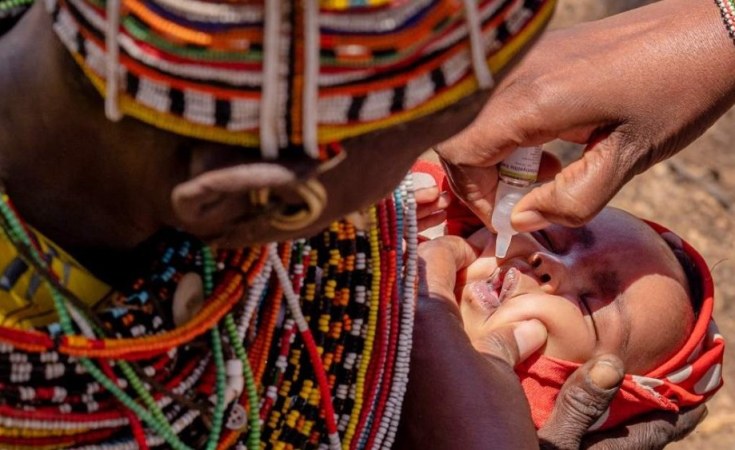- Countries can now submit plans to introduce diphtheria, tetanus and pertussis (DTP)-containing vaccine boosters (DTP boosters) and the six-in-one hexavalent vaccine
- Gavi and partners are also working towards expanding the portfolio of offerings in 2024, including the hepatitis B birth dose and rabies vaccines
- Thabani Maphosa, Managing Director of Country Programmes Delivery, Gavi: "By continually expanding our vaccine portfolio, and targeting the children and communities most frequently left behind, we can save more lives, support child and adolescent health through vaccinations beyond infancy, and make way to provide other important services."
Countries eligible for Gavi support can now apply to introduce diphtheria, tetanus and pertussis (DTP)-containing vaccine boosters (DTP boosters) - as well as to switch to hexavalent vaccine - a six-in-one vaccine that combines the pentavalent vaccine (diphtheria, tetanus, whole-cell pertussis [DTwP], hepatitis B and Haemophilus influenzae type b) with inactivated polio vaccine (IPV).These new programmes, part of Gavi's commitment to leave no child behind with immunisation, will enable countries to protect more children against common childhood illnesses, use public health resources more efficiently and strengthen the reach of health systems. Combined, the three pathogens, DTP, are estimated to kill about 110,000 people annually, with the greatest burden in Asia and sub-Saharan Africa (mainly children aged one to four years). The DTP boosters will be vital in protecting children who have not received any routine vaccines, are under-immunised or come from missed communities. Low immunisation coverage makes vulnerable communities susceptible to recurrent vaccine-preventable disease outbreaks, worsening health and development outcomes. Providing these boosters also reinforces a life-course approach to vaccination and can strengthen vaccination contacts during the second year of life and in school health programmes.
The Gavi Board approved the whole-cell pertussis hexavalent vaccine in June 2023. This combination vaccine is expected to help countries deliver protection against all six diseases more efficiently and reduce programmatic challenges due to multiple vaccines and injections - which would reduce the burden on children, caregivers and health care workers and make it easier to reach un- and under-immunised children. In support of polio eradication, combining IPV with pentavalent increases opportunities for under-immunised children to receive sufficient IPV doses, and providing IPV as part of a combination vaccine with other core antigens ensures streamlined integration into national immunisation programmes, as we look toward a post-polio world.
Thabani Maphosa, Managing Director of Country Programmes Delivery, Gavi, said: "Immunisation reaches more communities than any other routine health intervention; however, there are still too many un- and under-immunised children in the world, and this situation has been made worse by the COVID-19 pandemic. By continually expanding our vaccine portfolio, and targeting the children and communities most frequently left behind, we can save more lives, support child and adolescent health through vaccinations beyond infancy, and make way to provide other important services."
Every five years, Gavi develops a Vaccine Investment Strategy, with a rigorous process to identify new vaccines or vaccine candidates that would have the most impact in lower-income countries. DTP boosters, the hepatitis B birth dose, rabies vaccine, multivalent meningococcal conjugate vaccine (MMCV) and respiratory syncytial virus (RSV) vaccines were all part of Gavi's 2018 Vaccine Investment Strategy. However, the introduction of these products was delayed due to the COVID-19 pandemic and countries' limited bandwidth to establish new programmes or, in the case of RSV vaccine and MMCV, lack of WHO-approved vaccines. Gavi and Alliance partners are preparing to open the funding windows for the remaining vaccines in 2024. The process of developing Gavi's 2024 Vaccine Investment Strategy is underway, with a shortlist of candidates to be discussed at the Gavi Board meeting this week in Accra, Ghana.
Notes to editors
- From rabies to hepatitis: Gavi to start rolling out new vaccines to lower-income countries: https://gavi.org/vaccineswork/kickstarting-essential-immunisation-roll-outs
- More on the hexavalent vaccine: https://gavi.org/our-support/guidelines/hexavalent-vaccine-programme-information
- Articles related to the mission to reach children who have not received any basic, routine vaccines: https://gavi.org/vaccineswork/tag/zdc
- Here is how whole-cell pertussis hexavalent vaccine differ from existing vaccines: https://gavi.org/vaccineswork/new-hexavalent-vaccines-are-coming-what-impact-could-they-have
About Gavi, the Vaccine Alliance
Gavi, the Vaccine Alliance is a public-private partnership that helps vaccinate more than half the world's children against some of the world's deadliest diseases. The Vaccine Alliance brings together developing country and donor governments, the World Health Organization, UNICEF, the World Bank, the vaccine industry, technical agencies, civil society, the Bill & Melinda Gates Foundation and other private sector partners. View the full list of donor governments and other leading organisations that fund Gavi's work here.
Since its inception in 2000, Gavi has helped to immunise a whole generation - over 1 billion children - and prevented more than 17.3 million future deaths, helping to halve child mortality in 78 lower-income countries. Gavi also plays a key role in improving global health security by supporting health systems as well as funding global stockpiles for Ebola, cholera, meningococcal and yellow fever vaccines. After two decades of progress, Gavi is now focused on protecting the next generation, above all the zero-dose children who have not received even a single vaccine shot. The Vaccine Alliance employs innovative finance and the latest technology - from drones to biometrics - to save lives, prevent outbreaks before they can spread and help countries on the road to self-sufficiency. Learn more at www.gavi.org and connect with us on Facebook and Twitter.


